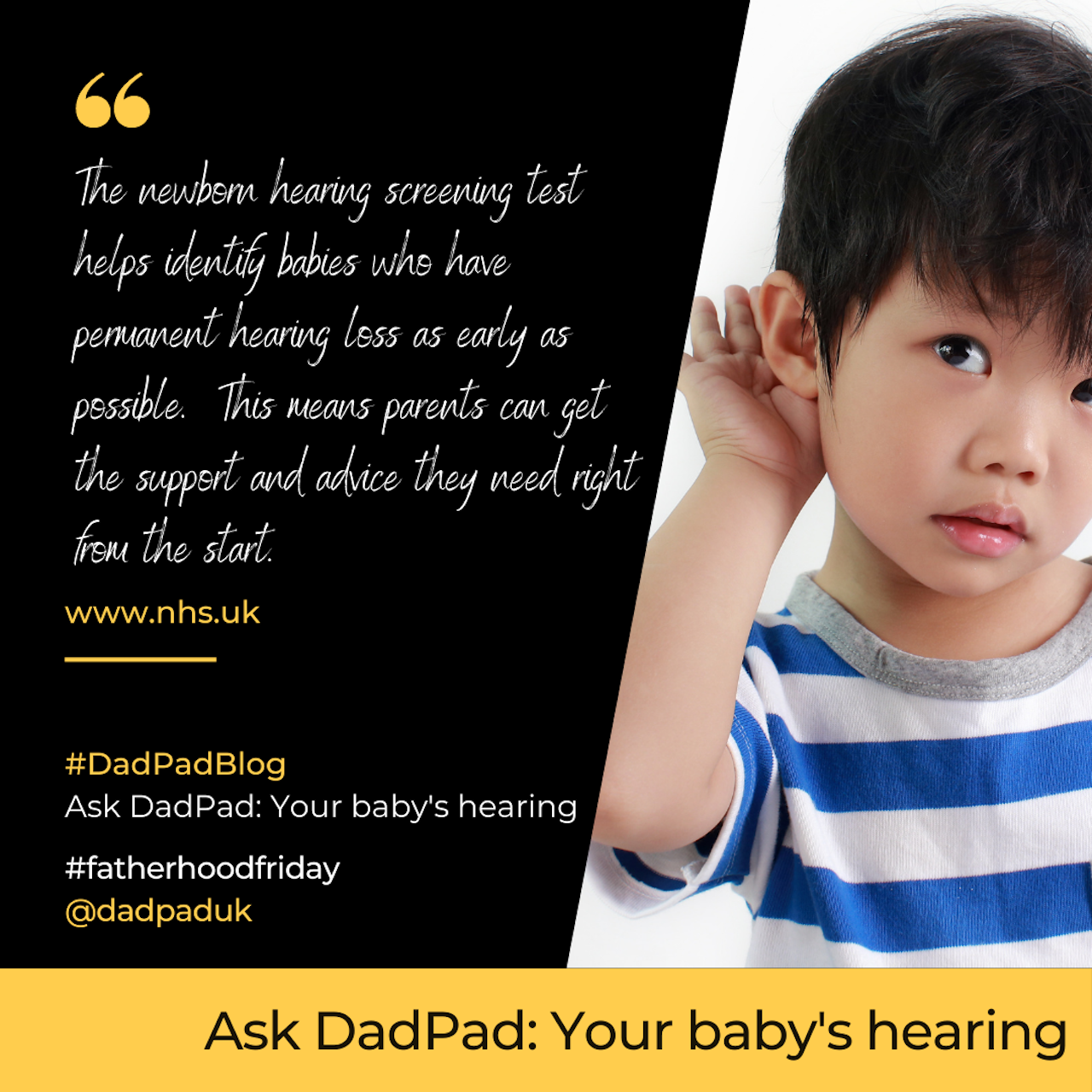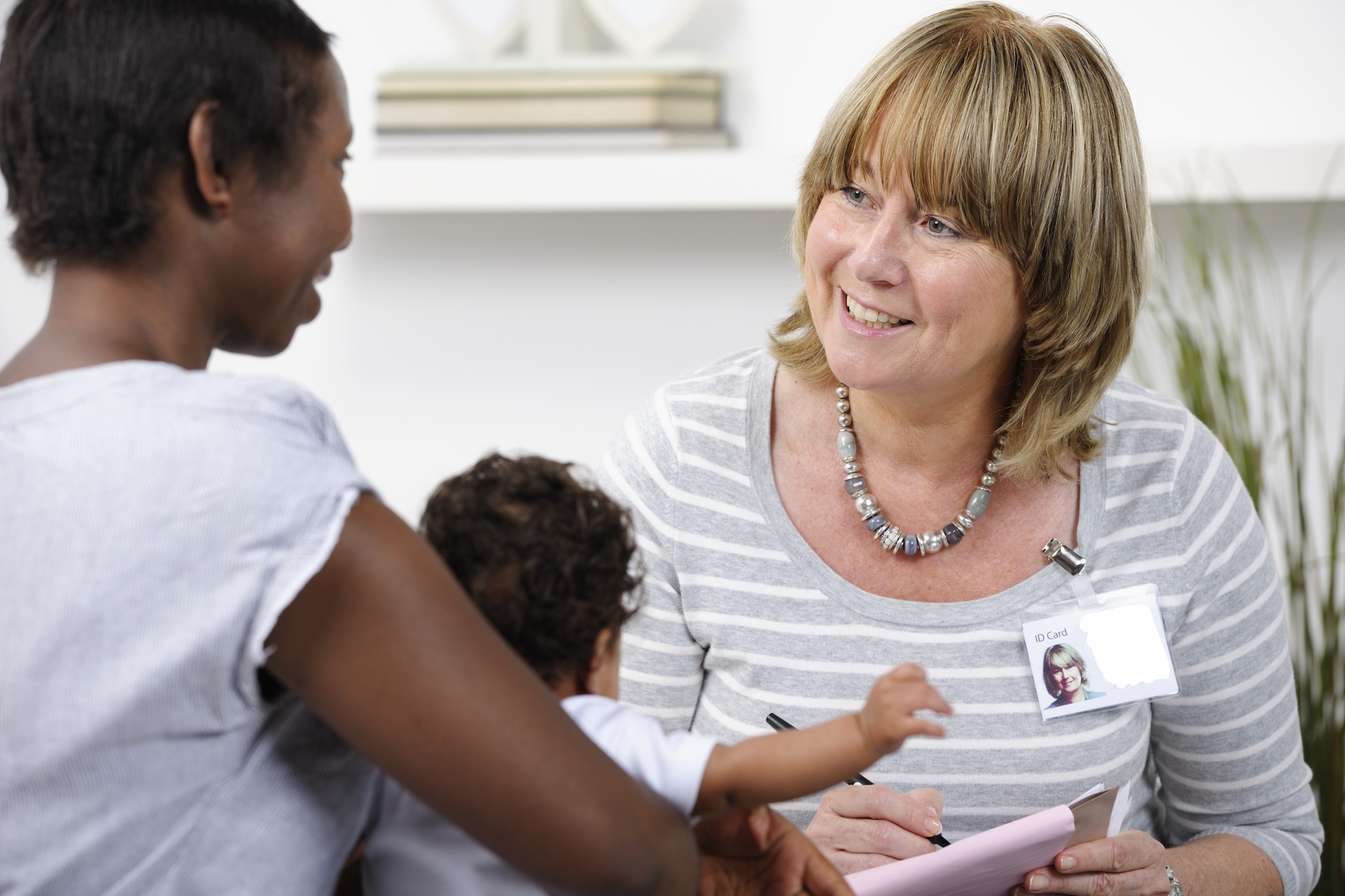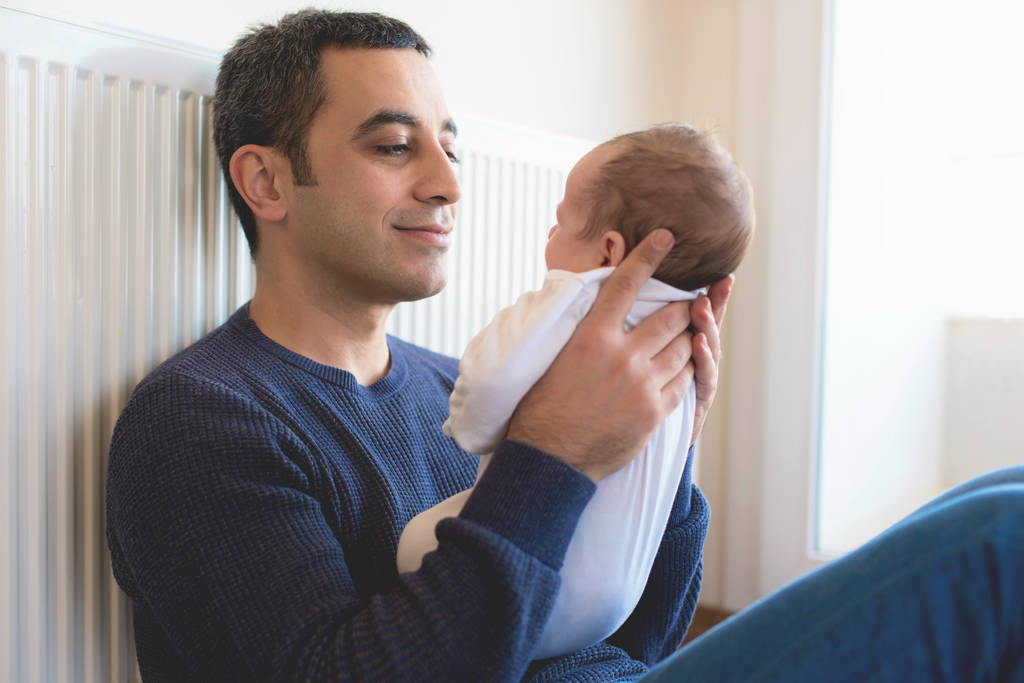
Ask DadPad, Health & Wellbeing
Ask DadPad: Your baby’s hearing
Posted on 30th April 2021

Next week (3rd-9th May) is #DeafAwarenessWeek, an annual event to raise awareness of the challenges of deafness and hearing loss.
To tie in with this, we thought it would be a great opportunity to post a follow-up to last September’s blog all about your baby’s eyes and vision, this time looking at their hearing. We’ll set out all you need to know about how their hearing develops, the tests that will be carried out to ensure that they are not experiencing any hearing loss, and the things that you and your partner can do to check that your baby’s hearing is developing as it should be and to help them develop good communication skills.
When does my baby begin to hear?
It might surprise you to learn that your baby will have been potentially able to hear noises from as early as 15 weeks of pregnancy! Their hearing will continue to develop and improve throughout the rest of pregnancy, although they will not be ‘hearing’ in the same way that we do, as explained by Linda, a clinical psychologist who features in an NHS video:
The sounds that baby hears are the kind of sounds you would hear if you were underwater. Everything’s there, but everything’s very muffled, and a little bit less loud, and certainly, remember, you’re talking a different language than baby knows; baby doesn’t know word language yet.
Baby will, of course, be hearing a whole mix of weird and wonderful noises from within the womb, including in particular all the noises that mum’s body is generating: her heartbeat, her breathing, her digestive system, and – of course – her voice.
In addition to this, though, baby will also be able to hear noises from outside of mum’s body – and this includes your voice as dad. Linda has also explained how dad’s voice differs to baby from mum’s:
Baby is going to get used to the voices that he’ll hear when he’s in the world and dad’s voice is lower than mum’s, so that’s a different kind of picking up and it’s a kind of more rhythmic picking up so dad’s voice is REALLY important; it gives a sense of safety.
As well as the benefits that you’re bringing to your baby’s hearing whilst talking to your partner’s bump, it’s also worth remembering that this is a great opportunity to start the bonding process with your unborn baby. As we discussed in our How do I bond with my baby? blogpost from last year, forming a strong and secure attachment with your baby is one of the most important things that you can do, as a dad, and seeking out opportunities to do this – from the earliest stage – is crucial. Yes, it can sometimes feel a bit bizarre, talking randomly to your partner’s growing tummy, but knowing that your baby is not only hearing you, but also remembering that sound as something that makes him feel happy and (from somewhere around 24-26 weeks of pregnancy) also potentially reacting to that sound, should help you to persevere!
Knowing what to talk about can sometimes be tricky but ideas might include:
- telling baby about your day, his family, your house, his room;
- letting him know the plans that you and baby’s mum have for him (and evolutionary anthropologist Dr Anna Machin has suggested that imagining, anticipating and dreaming about your baby is a really great way of starting the dad:baby bonding process);
- singing some nursery rhymes or other songs to him;
- letting him know how much he is loved.
Once baby is born, his hearing will continue to develop during the first six months or so of his life. This is partly due to the fact that his ears may take a while to clear of the fluid that surrounded him when he was in mum’s womb, and partly because the ‘hearing’ parts of his brain are still developing.

How will my baby’s hearing be checked, following birth?
Your baby will usually have his hearing checked very early on in life; your baby may have the Newborn Hearing Screening Test (also sometimes called the automated otoacoustic emission (AOAE) test) carried out on him before leaving hospital, or he may be tested by a member of your Health Visiting Team, often at the time of their visit to your home to carry out the New Baby Review.
The test is a very simple one and shouldn’t cause baby any distress or discomfort at all. The health professional will test one ear at a time by placing a soft earpiece – which looks a bit like a headphone – into baby’s ear and, through this device, soft ‘clicking’ noises will be played. A machine will then be able to detect whether or not your baby is hearing those sounds.
The health professional will be able to tell you the results of the test immediately, and most babies will be found not to have any problems with their hearing.
However, it is possible that the test might need to be repeated, or that baby will need to be referred for further tests. This doesn’t necessarily mean that anything is wrong; for example, lots of babies may still have fluid in their ear(s) following birth, which can cause problems with the test. Further, if your baby was not relaxed or was upset at the time of the test, or if there was a lot of background noise in the room where the test was carried out, this can also cause difficulties.
It’s worth remembering that, as with all health checks offered via the NHS for your baby/child, the hearing test is not compulsory. However, it’s important to consider that, if your baby is found to have any difficulties with hearing, an early diagnosis is useful to help provide baby with the best support and/or treatment possible. Hearing is a crucial sense in terms of a baby’s development, and an undiagnosed hearing problem can lead to delays and difficulties in developing communication, speech and language skills.
What other tests might be carried out on my newborn?
As noted above, if the health professional was unable to get a clear response from the initial Newborn Hearing Screening Test, they will either then carry out a second test on another occasion or they might carry out a different type of test, called the automated auditory brainstem response (AABR) test. This test isn’t nearly as scary as that name might suggest!
This time, the health professional will place three sensors – in the form of small pads – on baby’s head and neck, and also soft headphones onto baby’s ears. As with the Newborn Hearing Test, baby will again be played gentle ‘clicking’ noises through the headphones and, again, the results will be available and shared with you as soon as the test is completely (no more than 5-15 minutes).
There is also an NHS video available online which gives a helpful overview of the screening tests and will hopefully offer reassurance as to the non-stressful nature of these tests on baby.
And will there be any more hearing tests as my child gets older?
You will get the opportunity to discuss any concerns that you have regarding your child’s hearing at the regular Developmental Reviews that you will have with your Health Visiting Team; they will be able to sort out further hearing tests for your child if needed.
Your child will also have their hearing tested again once they start school.

Is there anything that I can do to help my baby’s hearing develop?
Absolutely! As well as helping your baby’s hearing develop, you’ll also be helping their speech, language and communication flourish, as well as continuing to strengthen the bond between the two of you.
When newborn, baby will especially love to hear the voices of his parents, as these are sounds that are familiar to him from his time in mum’s womb. Baby will soon learn to recognise and start to turn his head towards the sound of your voice. Talking and singing to your baby – always in a calm, gentle, and loving voice – about anything and everything will massively help his development, so use every opportunity that you can to do this. Try varying your pitch and tone a little, to make it more interesting for baby – and also feel free to mix in ‘adult conversation’ alongside ‘baby talk’. Although you might not realise it, baby will be picking up key lessons about language and communication from the rhythm and tone of your voice; once he begins to ‘talk’ back to you, he will also be able to learn about taking turns to talk if you ‘listen’ and then ‘respond’ to his ‘conversation’. Talking about what you’re doing can also help you keep calm when doing something with baby that you’re perhaps not feeling especially confident about – e.g. changing his nappy, dressing him, or bathing him.
One of our DadPad animations (below) provides guidance on talking with your baby:
Baby is also very likely to enjoy listening to music. Whilst there’s no evidence that playing classical music to baby will make him cleverer, there are still good reasons for introducing music to him – even whilst he’s still in the womb – as explained by clinical psychologist Linda:
Music’s great, because what baby hears most is the regular, rhythmic beat of (mum’s) heart and (mum’s) own body working. They LOVE regular rhythm, so if you give them music it’ll make them soothed and calm.
As well as the traditional nursery rhymes and lullabies, you could also try playing baby the sort of music that you enjoy, as he will like to hear a variety of sounds. You’ll soon be able to tell which styles of music he prefers. You can also play him classical music via radio stations, sing to him (don’t worry about how bad you might think you sound – baby will still enjoy it), and find other things around the house which make rhythmic or musical sounds, such as wind chimes, a ticking clock or a wind-up toy. Many babies also enjoy ‘white noise’ as it mimics the repetitive noises that they would have heard when inside mum’s body – parents sometimes find that the noise of the vacuum cleaner, washing machine or even a hairdryer (although obviously be careful not to leave this on unattended or to blow the hot air in baby’s face!) can help baby relax and fall asleep.
Because baby’s brain is developing at an amazingly fast rate, baby’s speech, language and communication skills will be also be growing and changing on an almost daily basis. You’ll find lots of information online about the ‘milestones’ linked to hearing and communication that your baby should be able to meet by a certain age (we’ve included links to some of these at the bottom of this page) and they’re a great way of trying out some different ‘experiments’ with your baby. Not only do these give you an indication of whether you might want to speak with your Health Visitor or doctor if you are concerned about some aspect of your baby’s hearing and/or speech and language development, but they also give you lots of ideas for fun things to do with baby which are appropriate to their age and development.
Some of these milestones include:
By around three months – baby should be able to:
- react to a loud or sudden noise – the ‘startle reflex’ is something that should be present from birth, and your GP or Health Visitor will usually check for this
- recognise your voice and that of baby’s mum – in response to your voice, he might start to turn his head towards you and/or even make an attempt to ‘talk’ back in response
By between four and six months – baby should be able to:
- smile, laugh and respond in an excited way to your voice
- enjoy toys which make a sound, such as rattles
- watch your mouth as you speak
- start to repeat and make sounds – things like ‘ooh, ‘ah’ and also consonant sounds, such as ‘b’ and ‘m’
By between seven and twelve months – baby should be able to:
- understand a few words – especially those used for common things (things like ‘cup’, dog’, ‘mummy’, ‘daddy’ and ‘teddy’)
- enjoy playing games like peek-a-boo and pat-a-cake with you
- imitate simple words, and maybe even use them appropriately
- listen and start to be able to respond to requests, such as ‘no’ and ‘come here’
By between one and two years – baby should be able to:
- recognise and join in with his favourite songs
- follow one-step commands (such as ‘come here’)
- follow two-step commands (such as ‘get teddy and come here’)
- enjoy having stories read to him
- learn more and more words each month
Do remember, though, that these are simply guidelines and that all children are different, developing at their own pace and meeting their milestones at different ages. However, the milestones are also a useful way of spotting whether your baby might be having difficulties with his hearing, so don’t be afraid to discuss any concerns that you have with your Health Visitor.
What things might increase the risk of my baby having a hearing problem?
Hearing problems in babies are rare: somewhere between 1 and 3 babies in every 1,000 will be born with some degree of hearing loss, whilst others may developing hearing difficulties at a later point in childhood. This means, of course, that – even if your baby has passed their Newborn Hearing Screening Test – it’s still important to keep an eye out for any signs that they may be having difficulty hearing. The milestones set out above will help you with this.
In terms of identifying babies at increased risk of experiencing some form of hearing loss, the following can have an impact:
- being born prematurely (these babies will always be given both of the newborn hearing tests), of low birth weight and/or spending time in NICU (neonatal intensive care unit) following birth. Indeed, in babies who have spent more than 48 hours in NICU, the rate of hearing loss is increased to 1 in every 100 babies. The health professionals caring for your baby will be well aware of this and will be monitoring your baby in this respect, as well as being able to answer any questions or concerns that you might have;
- a family history of hearing problems – e.g. if you or baby’s mum, or any of baby’s siblings, have hearing loss;
- regular ear infections, colds and/or allergic symptoms;
- experiencing certain illnesses – such as meningitis or scarlet fever;
- certain conditions experienced by mum during pregnancy – such as rubella (German measles), toxoplasmosis or cytomegalovirus (CMV); and
- exposure to very loud sounds.
What if my baby is found to have a hearing problem?
If the health professional was unable to get a clear result from either or both tests, they will most likely refer your baby to a hearing specialist who will be able to carry out further tests. It’s important to remember that, even if your baby is referred to a specialist, it still doesn’t necessarily mean that they have permanent hearing loss.
This appointment will be a longer one, but – again – you’ll get the results of all the tests immediately and the specialist will be able to let you know what those results mean for your baby and whether any more tests are required.
If you find yourself in a situation where your baby is found to have or potentially have some level of hearing loss, the specialists involved will be able to answer your questions and provide you with further information as required. You might also want to have a look at some of the useful leaflets available online, including:
- The Institute of Health Visitors’ Parent Tips leaflets for situations of suspected hearing loss and confirmed hearing loss
- Public Health England parent information leaflets for situations of confirmed hearing loss in baby (available in different languages), hearing loss in one ear and mild hearing loss
References and further reading:
Campbell, Prof Stuart (2004). Watch me… grow!. London: Carroll & Brown Publishing Ltd.
Healthline Parenthood’s When can a fetus hear? webapge
NHS You and your baby at 15 weeks pregnant webpage (including the video of clinical psychologist, Linda)
NHS Newborn Hearing Screening webpage
NHS Looking at your baby’s hearing – an easy guide to screening tests for your new baby
NHS Hearing tests for children webpage
US Healthline Parenthood’s When can a fetus hear? webpage
Babycentre’s Baby hearing webpage
US National Institute on Deafness and Other Communication Disorders’ Your Baby’s Hearing and Communicative Development Checklist – a really useful checklist for hearing and communication-related milestones, in case you are concerned about your baby’s hearing
GOV.UK Newborn Hearing Screening: Making sounds checklist
GOV.UK Newborn Hearing Screening: Reacting to sounds checklist
Babycentre’s Developmental Milestones: Hearing webpage
US Stanford Children’s Health Age-Appropriate Speech and Hearing Milestones webpage

